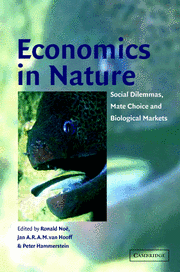Book contents
- Frontmatter
- Contents
- List of contributors
- Preface
- Acknowledgments
- 1 Games and markets: economic behaviour in humans and other animals
- Part I Economic behaviour in social networks
- 2 Social dilemmas and human behaviour
- 3 Cooperation and collective action in animal behaviour
- 4 Conflict, reconciliation and negotiation in non-human primates: the value of long-term relationships
- Part II Biological markets
- Part III Mating markets
- Index
2 - Social dilemmas and human behaviour
Published online by Cambridge University Press: 04 August 2010
- Frontmatter
- Contents
- List of contributors
- Preface
- Acknowledgments
- 1 Games and markets: economic behaviour in humans and other animals
- Part I Economic behaviour in social networks
- 2 Social dilemmas and human behaviour
- 3 Cooperation and collective action in animal behaviour
- 4 Conflict, reconciliation and negotiation in non-human primates: the value of long-term relationships
- Part II Biological markets
- Part III Mating markets
- Index
Summary
Introduction
Social dilemmas and the resulting problems of collective action are at the core of the study of how humans behave in interdependent situations. After an era of gloomy predictions based on the initial study of Prisoner's Dilemma (PD) games and the theory of collective ‘inaction’ (Olson 1965), recent theoretical work has made important breakthroughs for understanding human behaviour with guardedly more optimistic predictions. It is now theoretically well established that when individuals, modelled as fully rational actors, interact in an indefinitely repeated social dilemma situation, a PD game for example, it is possible for them to achieve optimal or near optimal outcomes and avoid the dominant strategies of one-shot and finitely repeated games that yield non-optimal outcomes (Aumann 1981; Fudenberg & Maskin 1986). Recent work in evolutionary game theory (Güth & Kliemt 1995; Sethi & Somanathan 1996) also identifies conditions under which cooperative behaviour backed by norms can be stable against invasion by narrow, self-interested strategies. It is also possible for individuals in social dilemma situations to do as badly round after round as is predicted for a one-shot or a finitely repeated series of situations. All potential outcomes between that produced by the dominant strategy and strategies leading to optimality are also possible equilibria. Empirical studies conducted in experimental laboratories (Ledyard 1995) and field settings (Bromley et al. 1992; Ostrom et al. 1994) provide evidence that more cooperation is achieved in social dilemma situations than the predicted zero level in one-shot or finitely repeated settings. Empirical studies of animal communities show both that the collective action problem exists in these settings and that multiple strategies are frequently found in these settings including full cooperators, conditional cooperators, full free-riders (see Nunn & Lewis this volume; and Nunn 2000).
- Type
- Chapter
- Information
- Economics in NatureSocial Dilemmas, Mate Choice and Biological Markets, pp. 23 - 41Publisher: Cambridge University PressPrint publication year: 2001
- 5
- Cited by

